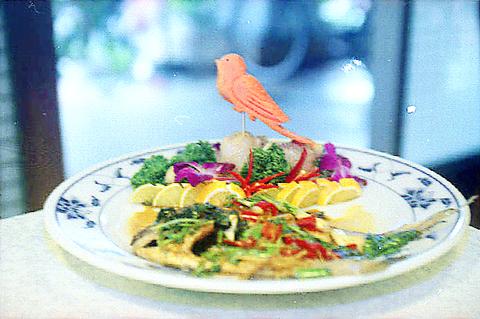Anho Rd may be one of the most up-market areas in Taipei, but that doesn't mean you can never get your money's worth there. If you are not into pompous facades and faux grandeur, Ching Xiang is a nice place to have good Hakka and Sichuanese cuisine. The frequent flow of Japanese tourists staying in neighboring Far Eastern Plaza Hotel testifies to Ching Xiang's attraction, which comes from genuinely good food instead of expensive decor.
Chef Wu has run the restaurant for three years, before which he worked as either a cook or restaurant manager for more than 30 years. At Ching Xiang, he wears both hats. In times of recession, Wu said, this is a way to survive without resorting to using substandard ingredients at the expense of the quality of the food.
Despite the restaurant's no-frills interior, there's one thing really spectacular to it -- the menu. There's a category for virtually everything -- from cold plates, tofu and tapanyaki to hotpot. The "egg" section alone lists nine dishes, which is "just part of what we make. If there's any other kind of egg dish you can think of, just tell us. The menu's flexible," said Wu.

PHOTO: DAVID VAN DER VEEN, TAIPEI TIMES
Although the restaurant specializes in Hakka and Sichuanese cuisine with Hakka stir-fry its most popular item, Wu, a Hakka trained in Sichuanese cuisine, doesn't mind blending the two styles or adding a Taiwanese flavor, "as long as it tastes good," he said.
Hakka-style sauteed fish (NT$380) is both tasty and nicely presented. The fish is sauteed with herbs and chili peppers, which take the excess grease from the fish, creating a light yet delightfully spicy taste. Good timing while cooking gives the fish a crispy gold crust that combines nicely with the herbs on top.
Pork ribs with spring onion (NT$350) also wins a prize for presentation with the generous portion of pork surrounded by a ring of crispy green vegetables. The lean part of the pork has a tender texture while the fat is so smooth it is far from repelling. It's a great find for meat-eaters.
For desserts, Ching Xiang recommends fried yam (NT$150), a good complement to the dishes. Purported to relieve the effects of diabetes, anemia and hypertension, yam's popularity has surged in Taiwan in recent years. The purple rolls are fried until they are crispy on the outside while the filling remains soft and sticky. Sweet but not cloying, it's a choice dessert for health-conscious diners.

In the March 9 edition of the Taipei Times a piece by Ninon Godefroy ran with the headine “The quiet, gentle rhythm of Taiwan.” It started with the line “Taiwan is a small, humble place. There is no Eiffel Tower, no pyramids — no singular attraction that draws the world’s attention.” I laughed out loud at that. This was out of no disrespect for the author or the piece, which made some interesting analogies and good points about how both Din Tai Fung’s and Taiwan Semiconductor Manufacturing Co’s (TSMC, 台積電) meticulous attention to detail and quality are not quite up to

April 21 to April 27 Hsieh Er’s (謝娥) political fortunes were rising fast after she got out of jail and joined the Chinese Nationalist Party (KMT) in December 1945. Not only did she hold key positions in various committees, she was elected the only woman on the Taipei City Council and headed to Nanjing in 1946 as the sole Taiwanese female representative to the National Constituent Assembly. With the support of first lady Soong May-ling (宋美齡), she started the Taipei Women’s Association and Taiwan Provincial Women’s Association, where she

Chinese Nationalist Party (KMT) Chairman Eric Chu (朱立倫) hatched a bold plan to charge forward and seize the initiative when he held a protest in front of the Taipei City Prosecutors’ Office. Though risky, because illegal, its success would help tackle at least six problems facing both himself and the KMT. What he did not see coming was Taipei Mayor Chiang Wan-an (將萬安) tripping him up out of the gate. In spite of Chu being the most consequential and successful KMT chairman since the early 2010s — arguably saving the party from financial ruin and restoring its electoral viability —

It is one of the more remarkable facts of Taiwan history that it was never occupied or claimed by any of the numerous kingdoms of southern China — Han or otherwise — that lay just across the water from it. None of their brilliant ministers ever discovered that Taiwan was a “core interest” of the state whose annexation was “inevitable.” As Paul Kua notes in an excellent monograph laying out how the Portuguese gave Taiwan the name “Formosa,” the first Europeans to express an interest in occupying Taiwan were the Spanish. Tonio Andrade in his seminal work, How Taiwan Became Chinese,